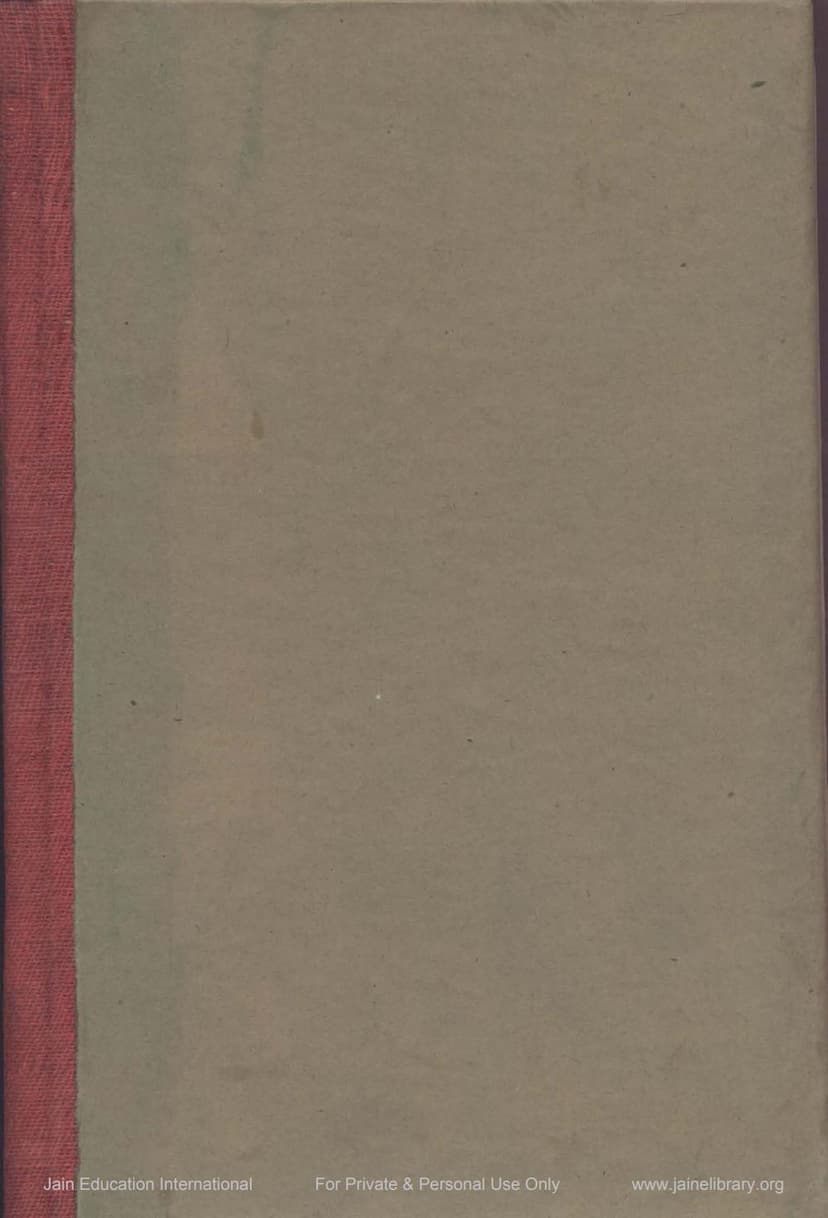Dharmabhyudayam
Added to library: September 1, 2025

Summary
Here's a comprehensive summary of the Jain text "Dharmabhyudayam" by Punyavijay, based on the provided pages:
Overall Context:
The provided text is an excerpt from a Jain work titled "Dharmabhyudayam," authored by Munishri Punyavijay, based on the original work by Shrimad Meghaprabhacharya. The publication is by Shri Jain Atmanand Sabha, Bhavnagar, and the publication details indicate it was released in Vikram Samvat 1974 (1918 CE). The content appears to be a dramatic presentation, likely a play or narrative, depicting events related to Jainism, specifically the teachings and actions of Lord Mahavir.
Key Elements and Narrative Flow:
-
Introduction and Prologue:
- The text begins with a prologue delivered by a "Sutradhar" (stage manager/narrator) and a "Nat" (actor).
- The Sutradhar announces a grand festival at a Jinendra temple (temple of the Jina), implying a performance is about to take place.
- They discuss the play's theme, which is identified as the story of "Dasharnabhadra."
- The Sutradhar expresses anticipation and mentions that the audience is eager to hear the "Dasharnabhadra Charitra."
- A messenger announces the arrival of a drama to be performed in accordance with the audience's wishes and the Sangha's (community's) command.
-
The King and His Devotion:
- The narrative then shifts to King Dasharnabhadra, who is seated in his palace.
- He engages in conversation with his minister, Sumati.
- The King expresses deep devotion to Lord Veer (Mahavir), acknowledging the blessings received through virtuous deeds and the merit gained from honoring the Jinas.
- He reflects on his own good fortune and the desire to offer gifts and express his gratitude to the Lord.
-
The Arrival of Lord Mahavir and the Grand Procession:
- The "Pratihar" (doorkeeper) announces the arrival of Priyavada, the gardener, who brings news of Lord Mahavir's approach.
- The King is filled with joy and eagerly awaits the divine presence.
- The text describes the auspicious sound of celestial drums and chants of victory ("Jai Jai") as people and celestial beings gather to welcome Lord Mahavir.
- Lord Mahavir arrives in a grand "Samavasarana" (divine assembly), accompanied by deities, Vidyadharas (celestial beings with special powers), and other beings.
-
King Dasharnabhadra's Humility and Renunciation:
- King Dasharnabhadra, deeply moved by the divine presence, prostrates himself before Lord Mahavir, offering prayers and seeking guidance.
- He then reflects on his own pride and realizes its futility when compared to the divine glory.
- He decides to take initiation (vows) and renounce his worldly possessions and kingdom.
- He expresses his intention to the minister and then proceeds to the Samavasarana to take his vows from Lord Mahavir.
-
The Intervention of Kamadeva (Madan) and His Defeat:
- Kamadeva (Madan), the god of desire and passion, arrives with his consorts Rati and Preeti.
- He sees King Dasharnabhadra, now a renunciate, and challenges him.
- Rati and Preeti express concern for Kamadeva, warning him not to provoke the King, who is radiant with his penance.
- Despite their warnings, Kamadeva attacks the King with his flower arrows.
- However, the intense spiritual aura and penance of King Dasharnabhadra, amplified by Lord Mahavir's presence, cause Kamadeva to be overcome and fall unconscious. His consorts Rati and Preeti also faint.
-
Indra's Arrival and Recognition of Humility:
- Indra, the king of the heavens, arrives with his retinue.
- He witnesses the scene and understands that Kamadeva's downfall was due to his own arrogance and the spiritual power of the King.
- Indra acknowledges the supremacy of Lord Mahavir and the exemplary renunciation of King Dasharnabhadra.
- He recognizes that his own worldly power and pride are insignificant in comparison.
-
The King's Son and the Succession:
- Indra instructs his minister to arrange for the coronation of the King's son, Sunandan, as the new ruler.
- Indra offers gifts and blessings to the new king and the kingdom.
- He expresses his admiration for King Dasharnabhadra's spiritual attainment and vows to follow the path of Dharma.
-
Concluding Remarks:
- The text concludes with Indra's prayer and acknowledgment of Lord Mahavir's teachings and the Dharmabhudyam itself, wishing for the prosperity of Dharma and the blessings of the Jina.
- The author, Shrimad Meghaprabhacharya, and the current editor, Munishri Punyavijay, are mentioned.
Themes and Significance:
- Devotion (Bhakti): The paramount theme is the deep devotion of King Dasharnabhadra towards Lord Mahavir.
- Renunciation (Tyaga/Vairagya): The King's decision to renounce his kingdom and embrace asceticism highlights the Jain ideal of detachment from worldly pleasures.
- Spiritual Power: The narrative emphasizes the immense power of penance, spiritual knowledge, and the divine presence of the Jina, which can overcome even the forces of desire and passion like Kamadeva.
- Humility and Pride: The contrast between King Dasharnabhadra's initial pride and his subsequent humility upon encountering divine power serves as a moral lesson.
- The Grandeur of Jain Teachings: The Samavasarana and the teachings of Lord Mahavir are depicted as sources of universal well-being and spiritual enlightenment.
- The Role of Asceticism: The text showcases the transformative power of embracing a life of asceticism for spiritual liberation.
In essence, "Dharmabhyudayam" through the story of King Dasharnabhadra, illustrates the path of righteousness, the triumph of spiritual strength over worldly temptations, and the ultimate significance of devotion and renunciation in Jainism.